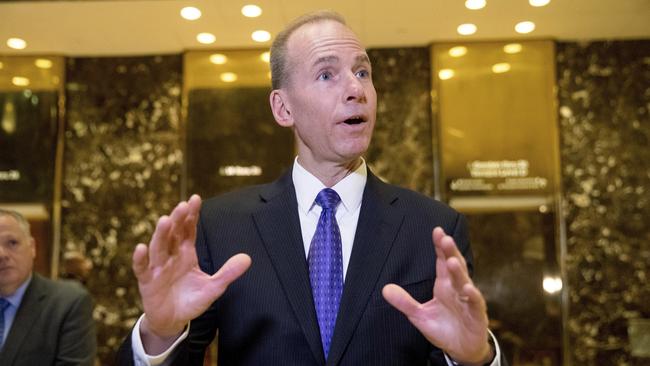Hidden fears over Trump’s trade policies haunt Boeing
Boeing’s predicament reflects that of many US firms attempting to navigate the unpredictable forces buffeting markets.

In the US the fear is concentrated on how the Trump trade policies will work. I have selected Boeing to illustrate how the change affects a great many American companies.
And in Australia we are being boosted by higher commodity prices but our deep fear surrounds our chaotic energy policies. In the profit-reporting season ahead, you will see a number of companies building up cash but not committing to investment partly because of energy uncertainty.
I would find being a Boeing director a really hard task.
Last year, three-quarters of the $65 billion in revenue generated by Boeing’s commercial division came from outside the US. If there was a 20 per cent tax on Mexican imports, Boeing would be hit hard. Exact figures are not available but Boeing was the biggest force in the $2.2bn in civilian aircraft engines and parts exported from Mexico to the US last year. Boeing and others have shifted much of their parts production to Mexico, so Mexican aircraft parts exports to the US have risen sevenfold over the last decade. The integration of Mexico into the Boeing aerospace supply chain helped the US company become more cost-competitive.
Its main rival, Airbus, is adopting a similar strategy and is opening an A320 assembly plant in Alabama because of its proximity to parts suppliers in Mexico.
Meanwhile, Boeing’s $8bn deal to sell 80 jets to Iran Air is in trouble.
First, Trump signed an immigration ban restricting people from seven Muslim-majority countries, including Iran, from entering the US. Then, after Iran performed a missile test, he issued a new round of Iranian sanctions.
Press reports say these new sanctions don’t specifically kill the Boeing deal but they could make it harder for it to go through, should Iran retaliate and cancel the deal. Airbus is selling 100 planes to Iran for about $10bn but that could also be in jeopardy because the Airbus jets are mostly made with US/Mexican parts.
Not helping Boeing’s cause is the fact that after reducing its commercial aeroplane division workforce by 8 per cent in 2016, more cuts are planned in 2017 because of fierce competition with Airbus and a drop in new orders.
Boeing directors are not alone in sitting on the edge of their seats wondering which way to move. Almost certainly they are going to be required to increase US parts production.
In Australia, our energy crisis is worse than anything that might arise out of the policies of President Trump. We face gas shortages and much higher prices in NSW and Victoria but both states have severe curbs and/or ban exploration.
States like Victoria and South Australia are promoting renewables with high targets but that requires base load back up because battery technology is not sufficiently developed. Victoria is actually reducing its base load capacity. The Federal Government is talking about a clean coal plant in northern Queensland.
That will not solve the problem in the most densely populated areas and most of the clean coal technologies are high cost, although it is possible there is a suitable low-cost one.
The ALP has a high renewables target but no base load power plans.
Like Americans, Australian voters are starting to realise that they must pay for all this with higher power prices and less jobs at a time when non-public servant incomes are stagnant. Companies that use large amounts of energy are restricting investment and banks are nervous about lending in areas that involve high energy.
The Federal Government has set up a high-powered ministerial committee to devise a long overdue plan. Hopefully that committee will not get bogged down for months and action can start immediately.
Shell flagged plans to erect gas-driven base load generators in partnership with solar. Shell have some gas so are biased but, at least in principle, it is one of the better new energy suggestions No plans to solve the problem have been produced by politicians in the major parties.
Footnote: I believe standing up to President Trump over refugees gave Malcolm Turnbull a real and well-deserved boost. But when I wrote along those lines last week (Turnbull’s got his mojo back and now it’s time for action, Feb. 3) my readers — middle Australia — were highly critical of both Turnbull and me.
These are not left-wing extremists. I read the comments and what that told me was the Malcolm has lost it among middle Australia. Words will no longer help him. He will need a lot of action and fast. And as today’s Newspoll results reveal, it may be too late.








While the American and Australian sharemarkets are both basking in the anticipation of a dramatic US revival on the back of lower taxes and other Trump policies, in both markets there is hidden fear. And there is a similar deep fear in Europe caused by the uncertainties of Brexit and political upheaval in the EU.